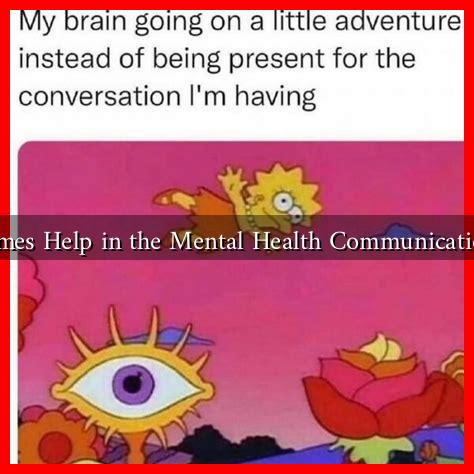-
Table of Contents
Can Memes Help in the Mental Health Communication Space?
In the digital age, memes have emerged as a powerful form of communication, transcending cultural and linguistic barriers. While often associated with humor and entertainment, memes can also play a significant role in the mental health communication space. This article explores how memes can facilitate discussions about mental health, reduce stigma, and foster community support.
The Power of Memes in Communication
Memes are more than just funny images or videos; they are a form of social commentary that can convey complex ideas in a digestible format. According to a study published in the journal *Computers in Human Behavior*, memes can effectively communicate emotions and experiences, making them a valuable tool for discussing sensitive topics like mental health.
Breaking Down Stigma
One of the most significant barriers to mental health treatment is the stigma surrounding mental illness. Memes can help break down these barriers by normalizing conversations about mental health. Here are some ways memes contribute to reducing stigma:
- Relatability: Memes often depict common experiences related to mental health, allowing individuals to feel understood and less isolated.
- Humor: By using humor, memes can make discussions about mental health less intimidating, encouraging people to engage in conversations they might otherwise avoid.
- Awareness: Memes can raise awareness about mental health issues, prompting individuals to seek help or support others in their struggles.
For example, the “This is Fine” dog meme has become a symbol for coping with anxiety and stress. It humorously illustrates the feeling of being overwhelmed while trying to maintain a facade of normalcy, resonating with many who experience similar emotions.
Fostering Community Support
Memes can also create a sense of community among individuals facing mental health challenges. Online platforms like Instagram, Twitter, and Reddit have become spaces where people share memes related to their experiences, fostering connections and support. Here’s how memes contribute to community building:
- Shared Experiences: Memes often reflect shared struggles, allowing individuals to connect over common feelings and experiences.
- Encouragement: Memes can provide encouragement and motivation, reminding individuals that they are not alone in their journey.
- Resource Sharing: Many memes include links to mental health resources, making it easier for individuals to find help.
A notable example is the “Sad Girl” meme, which has been used to discuss feelings of sadness and depression. This meme has sparked conversations about mental health, leading to increased awareness and support among users.
Case Studies and Statistics
Research indicates that memes can significantly impact mental health communication. A study conducted by the University of Pennsylvania found that individuals who engaged with mental health memes reported feeling more comfortable discussing their mental health issues. Additionally, a survey by the National Alliance on Mental Illness (NAMI) revealed that 64% of respondents felt that social media helped them better understand mental health issues.
Furthermore, platforms like Instagram have seen a rise in mental health-related content, with hashtags like #MentalHealthMemes garnering millions of posts. This trend highlights the growing acceptance of mental health discussions in online spaces.
Challenges and Considerations
While memes can be a powerful tool for mental health communication, there are challenges to consider:
- Misinterpretation: Memes can be easily misinterpreted, leading to misunderstandings about mental health issues.
- Oversimplification: Complex mental health issues may be oversimplified in meme format, potentially trivializing serious conditions.
- Exclusivity: Some memes may not resonate with all audiences, particularly marginalized groups who may feel excluded from mainstream discussions.
Conclusion
Memes have the potential to revolutionize the way we communicate about mental health. By breaking down stigma, fostering community support, and raising awareness, memes can serve as a valuable tool in the mental health communication space. However, it is essential to approach this medium with caution, ensuring that discussions remain respectful and inclusive. As we continue to navigate the complexities of mental health, embracing innovative communication methods like memes can help create a more supportive and understanding environment for all.
For more information on mental health resources, visit NAMI.

